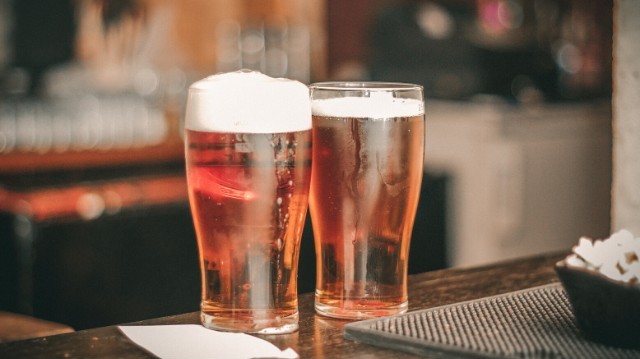Today we are going to have a fun little lesson and talk about things like alcohol, the drinking culture in Japan, and of course getting drunk. In order to say that though, you gotta learn the right vocabulary for it. What is the word for drunk in Japanese?
That question will be answered in the first section. In the second section I’ll provide you with some essential words related to this topic that you will benefit from learning and reviewing.
The third section will be about the drinking culture in Japan and the final part of today’s post will go over one phrase that you should avoid saying to a Japanese person at all costs.
The tricky thing about this danger phrase is that it sounds very similar to a common phrase you probably will want to use. Be sure to check out the difference.
How To Say “Drunk” In Japanese
Alright, so there are a couple of different words for this since we can be talking about someone who is in the state of drunkenness (inebriated) or we can be calling someone a “drunk” which of course is a person who habitually drinks alcohol in excess.
Let’s start with the verb first. The word for “to become drunk” in Japanese is 酔っ払う (yopparau).
- 早く酔っ払うために
- hayaku yopparau tameni
- in order to get drunk quickly
This means that in order to say a person is currently drunk, you would use the te-form with the help of いる (iru).
This can be said as 酔っ払っている (yopparatte iru) for “I’m drunk” or “she’s drunk” and so on.
- 酔っ払っているというのは面白いですね。
- yopparatte iru to iu no wa omoshiroi desu ne.
- Being drunk is interesting (funny), don’t you think?
However, on the other side of things, when you want to say that someone is a drunk you would change this verb into a noun by replacing the last う (u) with an い (i) for 酔っ払い (yopparai) which translates as “drunkard.”
- その酔っ払いは夫です。
- sono yopparai wa otto desu.
- That drunk is my husband.
There are lots of other “drunk” related verbs and words that typically use 酔う (you) in them somewhere, just like we’ve seen so far.
I won’t go over all of them, but a couple that are noteworthy are 酔っ払い運転 (yopparai unten) for “drunk driving.”
There’s also 酔いが回る (yoi ga mawaru) which means “to get drunk” or “to become tipsy.”
And perhaps the most well-known one 二日酔い (futsuka yoi) for “hungover.” The funny thing about this word is the kanji used for it literally says “two days drunk.”
This of course leads to the common joke of saying 三日酔い (mikka yoi) for those times when you are “three days drunk” lol.
Being hungover that much is no fun, and you generally spend the next day feeling like crap. :/
Related: Ask someone how they are feeling in Japanese.
Alcohol Related Japanese Vocabulary
Alright, now it’s time to go over some vocabulary for this topic. Let’s start with some drinks first.
- ビール (biiru) = beer
- ウイスキー (uisukii) = whisky
- ワイン (wain) = wine
- 赤ワイン (aka wain) = red wine
- 白ワイン (shiro wain) = white wine
- 酒 (sake) = sake
The Japanese word 酒 (sake) can mean two things. The first is simply any alcoholic drink. The other is to specifically refer to the Japanese rice wine that is famous around the world. Of course in English we call it “sake” since it’s a borrowed word from Japanese.
- 酒場 (sakaba) = pub
- 酒屋 (sakaya) = liquor store
- 居酒屋 (izakaya) = Japanese bar
Izakayas typically serve drinks and snacks and are used as an informal place for people to come together after work and relax.
- 飲む (nomu) = to drink
- 飲みすぎる (nomi sugiru) = to drink too much
- ゲロを吐く (gero o haku) = to puke
Hopefully you’ll stick to just the first word and not the second and third one, lol!
- ちびちび (chibi chibi) = sipping
- がぶがぶ (gabu gabu) = chugging
For a more complete list on alcohol related words, check out the article Getting drunk in Japanese: vocab list.
The Drinking Culture In Japan

Alcohol has been a part of Japan’s history for a long time.
Sake was really the first alcoholic drink that they figured out how to make, and it has been the national drink ever since.
That being said, when they learned about beer and whiskey in the early 1800s they quickly adopted them into their culture and started making their own.
Sapporo and Asahi are probably the two most well-known beer companies in Japan, while Suntory and Nikka are two of the top when it comes to whiskey.
And of course you can find other types of drinks like wine and spirits.
There are many occasions that Japanese people drink at such as weddings, home parties, when a person gets a promotion, and of course the famous 飲み会 (nomikai) which means “drinking party” in English.
Often times people will go out together after work for a drinking event with their coworkers and bosses, and let loose after a long day’s work.
The interesting thing about drinking in Japan is that there are certain etiquette rules that should be followed such as letting others refill your drink, waiting for everyone to have a drink before you start, and participating in saying 乾杯 (kanpai) which means “cheers” before taking your first sip.
If you enjoy drinking and get the chance to do so while visiting or living in Japan, then be sure to have a good time.
And if someone invites you to a drinking party and you want to accept, then try saying “let’s go” in Japanese.
On the other hand, if you are the one who is inviting people out for drinks, then you might want to be careful how you word the invitation. Keep on reading to learn why.
One Phrase You Need To Avoid
One thing that you might want to do is invite people out for drinks. This is especially true if you’re single and hoping to get a date with someone special that you’ve met.
However, you have to be really careful with how you phrase it because there is a right way and a wrong way, and they are both pretty close to one another.
The right way to invite someone out for drinks with you, or if you’re having a party at your place or something is the phrase 飲みに来てね (nomi ni kite ne) which means “come over and have drinks.”
The wrong way to say it is 飲んで来て (nonde kite) which means “come drunk” and sounds like you’re telling them to get wasted first and then come over and hang with you. In other words, it’s a booty call.
[Dogen]
One of these phrases will get you a date. The other will get you a black eye!
Do You Have A Hangover From This Lesson?
Hopefully you got a lot out of today’s lesson and it didn’t leave you feeling 二日酔い.
If you’ve got any questions or anything to share, let me know by leaving a comment down below!
Thanks for reading and I’ll see you next time!
Further Resources for Learning Japanese:
#3 Get My eBook (Secrets to Learning Japanese) for Free

またね!
